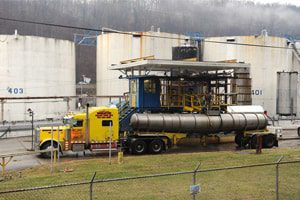
Some 300,000 people have been without water since January 9th due to a chemical spill that tainted West Virginia’s Elk River and is being blamed on gaps in regulation and hand-offs on the part of bureaucrats. A number of regulations have not been completed and other key items were handed off by bureaucrats, which may […]
 Some 300,000 people have been without water since January 9th due to a chemical spill that tainted West Virginia’s Elk River and is being blamed on gaps in regulation and hand-offs on the part of bureaucrats.
Some 300,000 people have been without water since January 9th due to a chemical spill that tainted West Virginia’s Elk River and is being blamed on gaps in regulation and hand-offs on the part of bureaucrats.
A number of regulations have not been completed and other key items were handed off by bureaucrats, which may have played a part in the huge chemical leak, which appears to have been taking place when oversight was lacking, according to a report by The Wall Street Journal. The source of the leak is a 48,000-gallon tank containing the chemical, 4-methylcyclohexane methanol (MCHM); 7,500 gallons of the chemical leaked into the river, leading to a nine-county ban on water, according to The Consumerist.
The tank and related storage facility, owned by Freedom Industries, were not under strict oversight or monitoring at either the state or local level, The Wall Street Journal reported. In fact, a state regulator speaking to the Journal indicated that the site has not been visited by environmental investigators for 23 years.
The lack of oversight since 1991 might have left the storage tank vulnerable to a hole that might have been long expanding, leading to last week’s leak. MCHM is also, for the most part, an unregulated chemical, complicating the matter, The Consumerist reported.
Freedom Industries included MCHM on the list of chemicals it had provided to the West Virginia Department of Homeland Security and Emergency Management, in compliance under the law. According to The Consumerist; however, the list, although sent in compliance with the law was not sent “anywhere useful.” A spokesperson for West Virginia American Water, as well as a spokesperson for a local emergency management group, both said that they had no idea that the list existed, according to the Journal.
The water company maintains a water source protection plan for its facilities, a water company spokesperson said; however, the most current plan was completed back in 2002. Also, the tank involved in this spill had been noted as a potential threat in that report, according to The Wall Street Journal. After completion of that plan, ownership changed on both the site and the tank.
The location was also not highly regulated, according to the Journal report because its main use was indicated as storage and was not indicated for manufacturing or active processing. Because the tank is considered an above-ground chemical storage facility, the Environmental Protection Agency (EPA) also did not heavily regulate the area.
Freedom Industries is legally required to ensure that containment areas are in place in the event of a spill and must also have procedures and processes in place to enable easy detection of leaks. The firm must also prepare and implement a plan for groundwater protection. To date, Freedom Industries had not provided the EPA with this plan, according to The Wall Street Journal.
The U.S. Occupational Safety and Health Administration (OSHA) never inspected the Freedom Industries location, and the state DEP has not been there since 1991. At that time, the location was different ownership and in place for a different purpose, The Charleston Gazette-News, wrote.
In response to the spill and the processes in place, the county-level emergency-response-planning group chairman said, “I don’t want to overregulate private industry, but this does show that there are some chemicals that fall under the radar,” the Journal reported.


